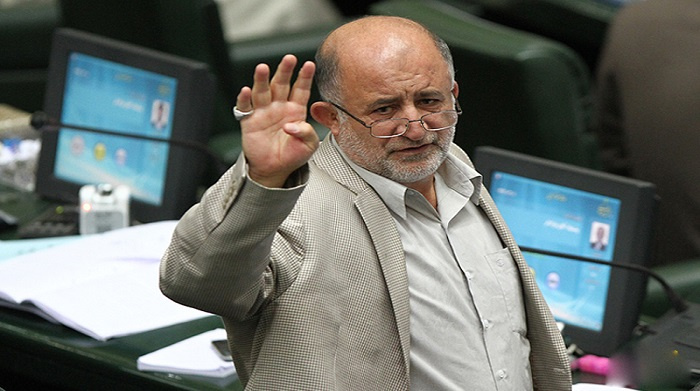Cross A Name and You Are In

Although Iranian voters have already distributed two-third of the seats available in the next parliament to their favorite candidates, unmindful comments might well come up with their deprivation of a representative, as political factions are in ambush to find flaws with rivals and eventually pave the ground for their elimination one by one. An out-of-the-box case for the reformists comes from the northwest.
In a tirade apparently made hours after parliamentary election results were official, Nader Ghazipour, a newly reelected MP who represents the people of Urmia, the capital city of West Azerbaijan Province, in the Majlis, has single-handedly delivered a myriad of insults, still counting.
Speaking to a cheering crowd of his supporters in Azeri, he indirectly called at least some of his colleagues in the parliament flatterers who serve officials and carry their bags!
“You gave me 200,000 votes in two hours because you want to sharpen me to strike the officials!”
With this being his vantage point, he launched a series of sexual slurs against women while name-calling unnamed nominees as foxes, kids and foals that have been blocked from the parliament in the country Ghazipour said has not been gained easily.
“The parliament is no place for women, it belongs to men,” he said elsewhere in his remarks, suggesting that women might dishonor their people if harassed in the parliament.
It is no wonder that he thinks so about women as in his openly unabashed slurs censored by most news agencies in Iran, if one judges by Ghazipour’s memoirs partly revealed in the speech. In fact, he reminisced a time he had allegedly harassed a colleague, Sheikh Ghodratollah Alijani in the Majlis’ restroom.
Persian speakers did not get away with his insults, too. “I speak with an [Azeri] accent and I am proud of it. What the hell have those who speak Persian done so far?”
Last but not least, in his vulgar speech came what he remembered from the eight-year war between Iraq and Iran. Believe it or not, he said he had slaughtered some six or seven hundred Iraqi POWs.
Ghazipour has apologized to Alijani calling the remarks a joke taken too seriously. He has also apologized to the women of Urmia, but clearly has no regrets for insulting other tribes and their women. “I apologize for my remarks, that upset the women of Urmia, because in no way was I talking about them,” he wrote. “But there are ladies in Parliament whose situation has not worked to their benefit.”
In one of the most rarely explicit reports on his remarks, Asr Iran has slammed Ghazipour as a preacher of immorality and a promoter of Pan-Turkism.
Alijani is now reportedly litigating Ghazipour and many are calling for the rejection of Ghazipour’s credentials. Zahra Bahramnejad, communications director for the vice-president in women and family affairs, is among those who want Ghazipour kept out of the parliament. “Mr. Ghazipour’s credentials should be rejected,” she told Rouydad 24. “When he offends half of the Iranian population, he should expect an answer, and the answer is rejecting his credentials.”
Urmia Women’s Society has also demanded that Ghazipour’s credentials be rejected. “The comments by this parliamentarian are a direct, flagrant offense against women,” the society said in a statement.
Even Mehdi Ghoreishi, Urmia’s Friday Prayers leader, has implicitly condemned the remarks. “For myself and the people I must complain against candidates who have institutionalized rudeness and disrespect in their speech,” he said in his sermon, without directly naming Ghazipour.
On the other side of the coin, a video interview in English with elected MP set to represent Tehran with twenty-nine like-minded moderates and reformists in the tenth parliament, which surfaced online two days after the election, has also proven to be controversial. Her ambiguous remarks about mandatory Islamic hijab for women in Iran have been interpreted as an offense to Islamic values and the country’s constitution. After her comments went viral on social media, Salahshouri immediately denied questioning the hijab in an interview with the Iranian Students News Agency (ISNA), expressing displeasure at how the original report was edited. She has apologized but called the whole episode a misunderstanding. Salahshouri said that the only distinction she made was that some women might prefer to wear the black chador while others would prefer a headscarf and long coat. Principlist media and commentators have either called on the Guardian Council to disqualify her before matriculating into the parliament or urged the parliament itself to reject her credentials.
A different move is also underway to shed doubt on the legitimate candidacy of another reform-oriented elected member of the next parliament, Mohammadreza Najafi on the basis that he was the interim head of Markazi Province Governorate’s Economic and International Affairs Coordination Department at the time of the election. Najafi has denied the reports, saying he had resigned before the deadline, even though supervisory positions are considered to be conflicting with parliamentary jobs.
In case principlists manage to expel one from Tehran’s fully elected thirty-man ‘list of hope’, proposed by a coalition of moderates and reformists backed by former presidents Akbar Hashemi Rafsanjani and Mohammad Khatami, principlist candidate Gholam-Ali Haddad Adel who led a losing list of the principlist coalition could be ushered into the Majlis.

